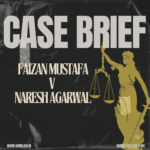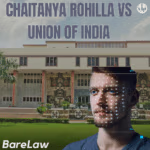Before the Delhi High Court
Anil Gupta v. Kunal Dasgupta 2002 (25) PTC 1 (Del)
Justice Vijender Jain
Judgment dated: 06.03.2002
Case brief on Anil Gupta v. Kunal Dasgupta 2002 (25) PTC 1 (Del)
Introduction:
Is protection of copyright allowable for a concept that is not written down or does not meet the fixation requirement of copyright law? Does Idea-Expression Dichotomy say so? Suppose I have an idea to write a movie, and I have not actually written the whole movie on paper or as a script, but just jotted down the film’s concept note and showed it to a producer in confidence. Now if the producer asks another director to develop a movie on the same idea I wrote as a concept note, but not exactly identical, can I still claim copyright protection over my submitted concept note? Just explain in simple terms; however, these case briefs below will give you clarity and answer the above question too. Here are the facts and issues.
Facts of the case:
Let’s get through some facts about this case. The plaintiff was Swayamvar Media Consultancy Company which was registered under Indian Companies Act 1956 who had come up with an idea of creating a ‘reality’ television show involving matchmaking and actual selection of spouses with real people being part of such program. Hence, they named this format ‘Swayamvar’ as per their concept note and there will be a mediator to host it. This idea was transformed into conceptual level by means of which plaintiffs copyrighted their respective concept papers during 1997 itself. In 1998, they met defendant no.1 and disclosed confidential details on one page “swayamvar” concept page whereby defendant reacted positively towards it. However in 2000, Plaintiff found the same concept published in an article in newspaper regarding starting “Shubh Avivah’s” program through Defendant No-2 which according to plaintiff was similar to their developed concepts; therefore plaintiffs approached court claiming infringement of their work under copy right act and sought appropriate Injunctions against defendants.
Issues Framed:
Accordingly, two main issues that were before Delhi High Court were,
Whether the concept called swayamvar as conceived by the plaintiffs would qualify as a novel idea for a reality Television Program in this case? If it is, then how can it be protected?
Can defendant launch its program in the name of ‘Shubh Vivaah’ which is very similar to swayamvar-conceptualized by plaintiff company? If no, what type of injunctions can be granted restraining the defendants?
Laws Involved:
Concept of Idea-Expression Dichotomy and Fixation requirement under Copyright law.
Arguments:
For the plaintiff’s party, Mr. Sibal distinguished three fundamental requisites for an interim injunction in this case. Firstly, he argued that a program made by the defendants after they had misappropriated the concept note and used it to make a program for the reason that it was like when anyone could have been mistaken or confused by some things similar to others were responsible for heavy losses on the part of plaintiffs. Secondly, it was contended that balance of convenience is in favour of the plaintiff and permitting the defendants to telecast such a programme would result into irreparable injury which cannot be compensated through damages at a later stage. It was submitted that ideas need not be expressed fully as mere hints are enough.
These were the main grounds upon which plaintiffs prayed for issuance of an injunction order.
In contrast, defendants argued that there is no copyright in themes or ideas and also in historical or mythological facts and circumstances as per ratio laid down by Hon’ble Supreme Court in R.G.Anand v. Delux Films and Others case. Counsel for defendant further submitted that plaintiffs had approached court at very late stage. He added that such contention cannot hold because ‘mediators’ show with matchmaking is new style.
Decision:
The court held thus,
Firstly, bare idea cannot be copyrighted under law; instead, once developed into a concept with required details shall be registered under copyright act. The court observed that conceptualization on swayamvar similar to mythological concept through developing its own creative way by plaintiff’s amounts to novelty; therefore it attracts protection under copyright law.
This amounted to infringement of Plaintiff’s Copyright if any act done by defendant towards telecasting TV show based on Plaintiff’s Concept notes. Accordingly, the Court ordered temporary injunction restraining Defendants from telecasting till disposal of suit.
Analysis:
After reading this brief we can conclude that according to Delhi High Court even concept notes which are also expression of an idea shall be copyrighted and protected under the law. It was not only criticised for wrongly laying down a precedent but also did not follow the principle of RG Anand Case in respect to Idea-Expression distinction. In that case, “mere ideas”, themes, historical and known facts, plots etc. shall never be protected under the copyright law as they are mere ideas, whereas their forms, manner, and arrangement in terms of expressions of idea would be protected under copyright law. However, this ruling has been overturned in the latest 2018 case of Sanjay Kumar Gupta v. Sony Pictures.
It is needless to say that the number of judges on Benches both in Sanjay Gupta’s case and in Anil Gupta’s case were same and therefore decision of earlier matter cannot be overruled by later case of 2018. So it is still a question with regard to validity of these cases, fortunately RG Anand case continues to be good law on this point.



